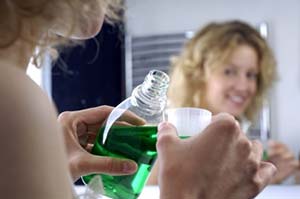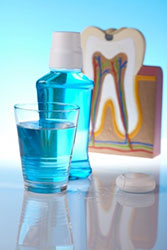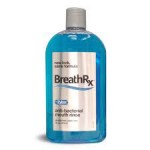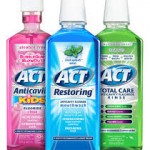Can You Use Too Much Mouthwash?
October 6th, 2016
 Everyone wants to maintain a healthy mouth with minty fresh breath. But if you use too much mouthwash, you might not get the intended results. Studies have shown that when it comes to mouthwash, there can be too much of a good thing.
Everyone wants to maintain a healthy mouth with minty fresh breath. But if you use too much mouthwash, you might not get the intended results. Studies have shown that when it comes to mouthwash, there can be too much of a good thing.
How Much is Too Much?
Dentists often recommend mouthwash as part of a healthy oral hygiene routine. A study of 4,000 people conducted by the University of Glasgow in Scotland found that people who used antibacterial mouthwash more than three times a day had an increased risk of developing mouth and throat cancers. Some dentists also feel that certain types of mouthwash are too harsh and should never be used.
The Consequences of Using Too Much Mouthwash
The Glasgow study showed that excessive use of mouthwash – three or more times a day – correlated with an increased risk of certain oral cancers; that doesn't necessarily mean, however, that using too much mouthwash automatically causes cancer.
People who frequently use mouthwash to clean their mouths and teeth may be at a higher risk for some oral cancers because of poor overall oral hygiene. Some may rely on mouthwash to cover up odors from unhealthy habits such as smoking, chewing tobacco or drinking alcohol, behaviors that are already damaging to the teeth and gums as well as the overall mouth health.
Others may use mouthwash or an oral rinse as a substitute for routine brushing, flossing, and dental visits. While mouthwash can be an occasional “quick fix” to kill bacteria and freshen breath, everyone – particularly those who smoke or drink alcohol – still needs to follow a routine of daily brushing and flossing.
Mouthwashes that are alcohol-based can be dangerous in any quantity because the alcohol destroys the natural mucous in the mouth that should shield and protect the mouth from cancer-causing irritants. Without the natural mucous barrier, a person’s risk of developing oral cancer rises.
A smoker, for example, is already at an increased risk of certain types of cancer. If that person also regularly uses an alcohol-based mouthwash to rinse after smoking, he is repeatedly rinsing out the protective mucous, eliminating the body’s natural defense mechanism and further increasing the risk of developing cancer.
Another problem with using too much mouthwash is that many of the “bad” bacteria are found beneath the gum line, and a quick rinse with an alcohol-based mouthwash will usually only kill the “good” bacteria in the mouth without affecting the potentially dangerous bacteria below. When the good bacteria are gone, the mouth becomes even more susceptible to infections as the harmful elements are allowed to grow unchecked.
Rinsing with an alcohol-based mouthwash eliminates the protective properties of the mouth’s natural mucous production and can also cause the mouth to feel dry. Dry mouth can lead to more bad breath, causing people to reach for more mouthwash. It’s a cycle that, combined with other poor hygiene habits, can put people at a high risk for oral cancers.
How to Properly Use Mouthwash
Dentist recommendations on the use of mouthwash vary based on the dentist and the patient. Those who choose to use mouthwash as part of their oral hygiene regimen should choose a gentler rinse that does not contain alcohol and follow the instructions on the label.
A general rule of thumb for safe use is to limit the use of mouthwash to one time per day, in conjunction with brushing the teeth and flossing two to three times per day and visiting the dentist one to two times per year for routine oral health exams and screenings for oral cancers.
Worried your mouthwash is doing more harm than good? Make an appointment to visit Water Tower Dental Care today! We can take a look at your mouth and recommend a safe mouthwash based on your needs, whether you have a sensitive mouth or need more aggressive care.

 When you’re fast asleep, the last thing you’re thinking about is your teeth. (Unless you’re having a dental dream, of course.) So it’s important to make sure that your teeth are well protected before you hit the hay for a long night of sleep. We’ve put together a short checklist that you can use every night before you go to bed to keep your teeth protected all night long.
When you’re fast asleep, the last thing you’re thinking about is your teeth. (Unless you’re having a dental dream, of course.) So it’s important to make sure that your teeth are well protected before you hit the hay for a long night of sleep. We’ve put together a short checklist that you can use every night before you go to bed to keep your teeth protected all night long. Over the years, the use of fluoride in both water and toothpaste has been very controversial. Some people argue that fluoride can cause serious health issues, while experts have found that fluoride can significantly improve dental health. So what’s the truth? Today, we’re going to look at the scientific facts to determine whether fluoride is good or bad for your teeth.
Over the years, the use of fluoride in both water and toothpaste has been very controversial. Some people argue that fluoride can cause serious health issues, while experts have found that fluoride can significantly improve dental health. So what’s the truth? Today, we’re going to look at the scientific facts to determine whether fluoride is good or bad for your teeth. Want to chew gum? Do it! As long as there’s xylitol in it, your dentist will approve. Xylitol is the perfect sugar alternative. Not only does it not cause tooth decay. It’s also good for your teeth. Yes, you heard that right. Something that tastes as wonderful as sugar actually benefits your teeth. Let’s take a look at why.
Want to chew gum? Do it! As long as there’s xylitol in it, your dentist will approve. Xylitol is the perfect sugar alternative. Not only does it not cause tooth decay. It’s also good for your teeth. Yes, you heard that right. Something that tastes as wonderful as sugar actually benefits your teeth. Let’s take a look at why. Many people are reluctant to floss, for one reason or another. However one convinces themselves, the reasons one avoids flossing is probably wrong. There are many myths about flossing that can easily be busted with a simple explanation. These are nine myths that tend to keep people from flossing, but should stop no one.
Many people are reluctant to floss, for one reason or another. However one convinces themselves, the reasons one avoids flossing is probably wrong. There are many myths about flossing that can easily be busted with a simple explanation. These are nine myths that tend to keep people from flossing, but should stop no one. Bad breath doesn’t just ruin dates. It can also be a problem that embarrasses you every time you open your mouth to talk to someone. Worst of all, a surprising number of people suffer from bad breath, even if they practice proper oral hygiene.
Bad breath doesn’t just ruin dates. It can also be a problem that embarrasses you every time you open your mouth to talk to someone. Worst of all, a surprising number of people suffer from bad breath, even if they practice proper oral hygiene.

 Mouthwash is an essential key to proper oral hygiene. However, many Americans misuse the product, either by using too much, too little, or often not using it for the right amount of time. To ensure that you’re using the proper mouthwash practices, we would like to offer you this simple guide to using mouthwash.
Mouthwash is an essential key to proper oral hygiene. However, many Americans misuse the product, either by using too much, too little, or often not using it for the right amount of time. To ensure that you’re using the proper mouthwash practices, we would like to offer you this simple guide to using mouthwash. If you're looking for that extra step in oral hygiene to help kill bacteria and freshen breath, look no further than mouthwash. There are three leading types of mouthwash that all serve different purposes depending on your needs. Here's a helpful guide to educate you on what you should look for in a mouthwash and why.
If you're looking for that extra step in oral hygiene to help kill bacteria and freshen breath, look no further than mouthwash. There are three leading types of mouthwash that all serve different purposes depending on your needs. Here's a helpful guide to educate you on what you should look for in a mouthwash and why.






 Website Powered by Sesame 24-7™
Website Powered by Sesame 24-7™